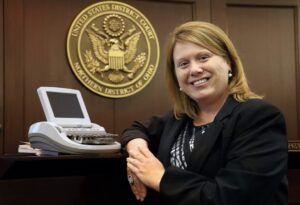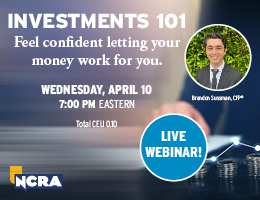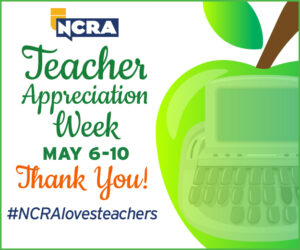Court reporters listen with laser focus. As I move through my world, when medical speakers finish long sentences often I am asked, “Questions?” Often, I shake my head. Not often, the specialist asks, “How’d you do that?”
Rarely will I share, “Degree in listening.” Often, I reply, “I listened.”
I was encouraged to write this as I trolled this topic past court reporters and students I am tutoring and coaching. Guilty.
The final frontier is the late chapter in my mother’s life. Professionals repeatedly prep me for the inevitable as Mom’s repeatedly gone to death’s door. Recently, white coats, “She’ll die if she doesn’t have surgery; she may die from surgery.”
Mom, in southern drawl, “I know I’m going to die; I’m not ready. God’s my roommate. He’s here all the time; my husband is with Him.” I maintain my reporter posture as others gasp. (I gasp in my car, sans witnesses.)
Dad’s health failed after taking care of Mom. I stepped forward and listened (on Dad’s path) as Dad worked to live, was not successful, and died. Meanwhile, Mom worked to live.
Now, as Mom’s guardian and following her path, I am asked to sign documents that require a witness 99 percent of the time. When I request a copy, I hear, “It’s for our file.” I do not sigh, and I do not bang my head on their counter. I count and say, “Attorneys prepped this. You require my signature and a witness. I request a copy.” Then I wait while a committee is formed to decide if I should get one. Guilty.
The phrase “not guilty, guilty, nolo contendere” has imprinted my thinking.
When Mom had her latest surgery, I witnessed the quickened pace of the O.R., then frantic ICU staff. I selected the teams; I had to trust them do their job.
After my mother’s complete deterioration from MRSA bacteria, the surgery became the least of our worries. Mom was abruptly discharged. (That was code for: “Medicare won’t pay.”) No facility wanted Mom’s required isolation. “We’d need to pull a bed. That reduces income.” I replied, “You’re kidding?” Nope.
Hours later, the surgeon opened a room. Hospital social workers spoke off the record. “You need to contact the county ombudsman. It’s against the law to tell you …” I focused on another gurney in Mom’s room.
Hindsight is a wonderful gift. Realtime is a shock, day after day.
Once the ambulance arrived, Mom, on oxygen, was crying. I needed to sign documents. Head down, I read the first paragraph. My first reaction? Deep sighs. Then I heard, “Just sign it. It’s important.” I pointed to “Patient Arrested.” EMTs who were gowned for isolation abruptly inhaled.
Me: “Arrested? Define.”
EMT: “We’re in a hurry.”
Me: “I can’t sign. I’m a court reporter. When I see ‘arrested,’ it’s for court exhibits. I’m not signing until the word is defined.”
EMT: “She arrested on the table. You’re not supposed to know. We must transport now.”
My court reporter discipline appeared again. Guilty. I will not be hurried when asked to sign documents. I read every line. I sat tall. Everyone was sighing, shifting posture.
Then I said, “Patient arrested? I am not to be told?”
“We have another ambulance on standby due to her arrest. We could get sued for telling you.” I signed — after I read every line.
The final frontier involves deciding when to stay on the sidelines and when to step forward. I listen to doctors, then write three words. Many ask, “Why only that?”
I softly say, “Data driven.” Thus far, that stumps everyone working to blow out of the room onto the next patient. Guilty.
Data driven. I listen to “we need to up meds” or “we need to wing-down.”
During symptom spikes, doctors do not return calls, and nurses are in report. “It’s being monitored” means “we’ll tell the next shift.”
Like many, I have marked many exhibits. Details are important, yes? I have found multiple incorrect confidential documents for other patients and incorrect lab reports with Mom’s papers. I am not stunned anymore. I simply hold up the document(s) — which I was encouraged not to take the time to read. Guilty.
Recently, I focused on professionals taking Mom’s blood pressure. When it reached 186/90, and a specialist said, “She’s just upset,” my focus shifted.
Thus, I phoned a cardiologist for an outside visit. Reactions were swift. Big mountains were moved within 24 hours. People were not happy. Oh well.
Perhaps the D.O.N. phoned, “Perhaps you’re not satisfied with our care here.” Perhaps I only listened. (Often, I choose when to word engage. I chose not here. That call told me more about them than me.)
Nurses and staff, “You really want to help your mother.” I avoid replying “gah” and am convinced it is our discipline. Guilty.
We are disciplined from school, work, and with each application using our skills. Individuals whisper, “You’re what we’re taught. You’re a textbook problem.” Me: “How so?”
“Patients with family members who ask questions and want answers are problems. You want questions answered. You listen and listen while they talk themselves blue. You don’t interrupt. You listen.” Guilty.
Professionals whisper, “You help me do a better job. Most people don’t ask questions. Your mother is alive because a family member picked up symptoms and med reactions quicker than staff.”
The final frontier involves many reporters, CART providers, captioners, and students telling me that they will not sign anything without reading every line. They insist on a copy of everything they sign, too. When they read documents, everyone sighs — while they read.
A high-profile official, “I took many hours to read mortgage papers. When I bought a car on installments the dealer closed at 8 p.m. I left at 9:30 p.m. Drives my family crazy.” Nolo contendere.
We are not rattled when we ask for information at work or regarding a family member. We have no shortcuts to listening. Guilty as charged.
Update: The cardiologist, after listening said, “She really slipped through the cracks.” I replied, “Mea culpa.”
I sat tall, softly asked, “Will you be top dog? I want all the other dogs to report to you. Doable?” Wearing scrubs, the nononsense cardiologist said, “Absolutely! I’ll write orders for daily details.” I almost hugged him.
When “transport” returned my mom to her room, I watched the scampering. “We sent wrong paperwork again? The doctor wants what? Really?”
I listened, softly said, “That specialist is now top dog. Thank you for making this possible.”
Now I have a top dog helping Mom. The final frontier necessitates continued attention to detail, continued focus, much listening. Guilty without an explanation.
The day after submitting this, a “care nurse” phoned to schedule a meeting. Me: “Sure. I request a list of all Mom’s diagnoses and meds.”
Voice pitched, she was off to the races. When she refused to give me this, I listened, believing I was not going to win this battle on the phone. She ended with, “This meeting is just for you to come and listen. It is not for chit-chat.”
We had our meeting. At the end, with my copy of meds and diagnoses, they asked me to sign a document.
Me: “I want a copy.”
Multiple people: “It’s for our files. Sign here.”
I leaned in: “If I sign, I get a copy.”
They actually said, “That’s okay, then.”
In a poker move, I put my hand on it, pulled it toward me. Court reporter here read each line with speed-reading skills. Then I lifted my hand. I stood, departed document-less, knowing they remain signature- less. Nolo contendere.




